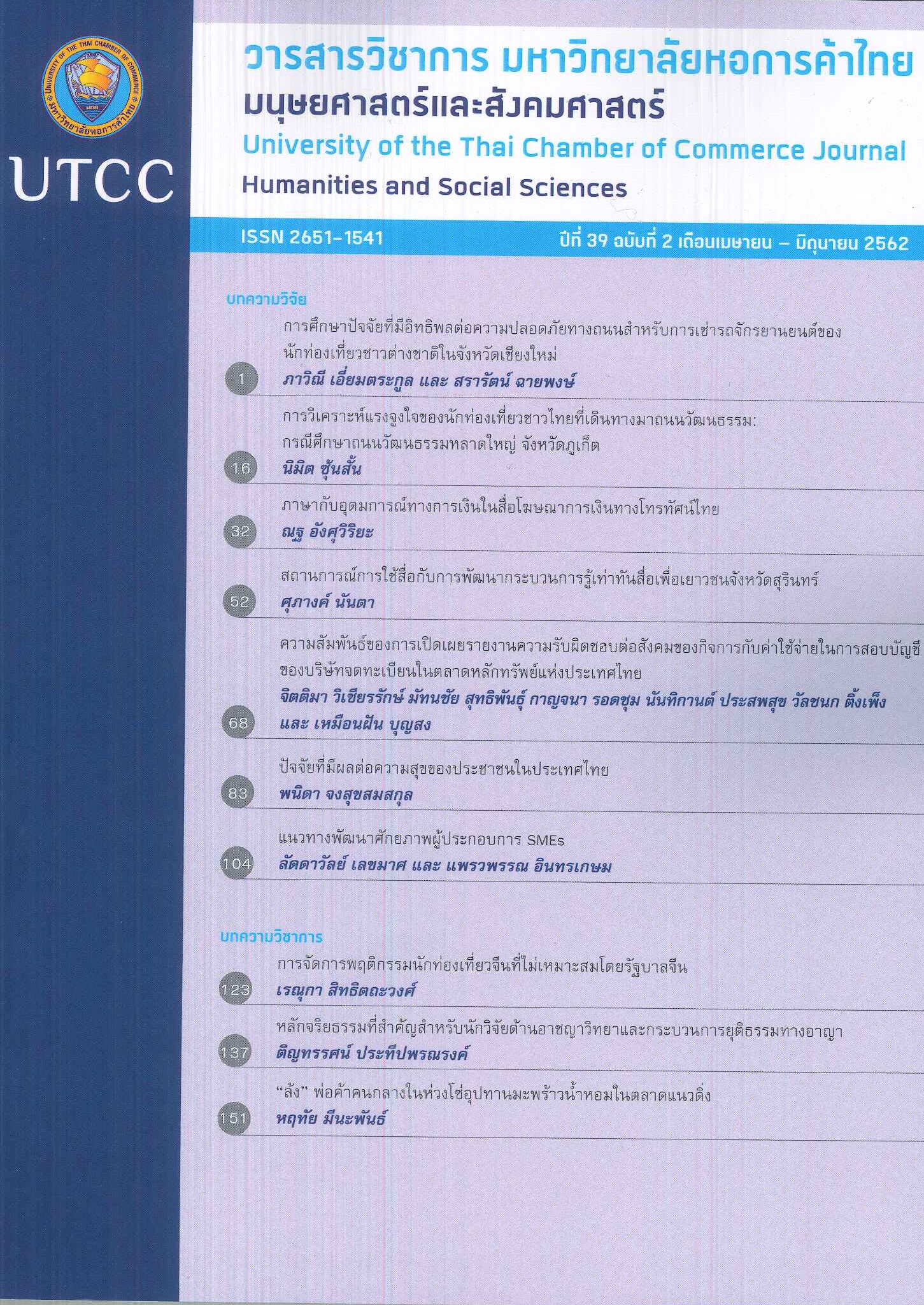Key ethical principles for researchers in the field of criminology and criminal justice system
Main Article Content
Abstract
Currently, the protection of human rights becomes norms in social context. The research involving human participants either for scientific or social enquiries requires serious ethical considerations. Ethics on the part of research participants include informed consent, confidentiality, anonymity, and harm prevention. In addition, there are ethical aspects, such as personal safety and law abiding, on the part of researchers themselves as well. This paper argues that ethical considerations are crucial for conducting social research. Thus, researchers should be aware of the importance of research ethics especially when conducting research on criminology and the criminal justice system so as to avoid violations of human rights or any trouble that the conduct of a research project may cause.
Article Details
ลิขสิทธิ์ของบทความ
ผลงานที่ได้รับการตีพิมพ์ถือเป็นลิขสิทธิ์ของมหาวิทยาลัยหอการค้าไทย ห้ามมิให้นำเนื้อหา ทัศนะ หรือข้อคิดเห็นใด ๆ ของผลงานไปทำซ้ำ ดัดแปลง หรือเผยแพร่ ไม่ว่าทั้งหมดหรือบางส่วนโดยไม่ได้รับอนุญาตเป็นลายลักษณ์อักษรจากมหาวิทยาลัยหอการค้าไทยก่อน
References
จิริทธิ์พล ภูวไชยจีรภัทร.(2560). ปัจจัยกดดันและปัจจัยการควบคุมตนเองกับการกระทำความผิดของเด็กและเยาวชน. (วิทยานิพนธ์ปริญญามหาบัณฑิต ไม่ได้ตีพิมพ์). สถาบันบัณฑิตพัฒนบริหาร
ศาสตร์, กรุงเทพฯ.
ชมรมจริยธรรมการทำวิจัยในคนในประเทศไทย. (2551). แนวทางจริยธรรมการทำวิจัยในคนในประเทศไทย พ.ศ. 2550. กรุงเทพฯ: โรงพิมพ์แห่งจุฬาลงกรณ์มหาวิทยาลัย.
ดิเรก ควรสมาคม. (2558). มาตรการทางกฎหมายเกี่ยวกับจริยธรรมการวิจัยในมนุษย์. วารสารนิติศาสตร์ มหาวิทยาลัยนเรศวร, 8(2), 65-88.
ติญทรรศน์ ประทีปพรณรงค์. (2561). รายงานการวิจัย เรื่องการพัฒนากลไกการดำเนินการกรณีทุจริต และประพฤติมิชอบขององค์กร ป.ป.ท. กรุงเทพฯ: สถาบันบัณฑิตพัฒนบริหารศาสตร์.
บุญมี แท่นแก้ว. (2539). จริยศาสตร์. กรุงเทพฯ: โอเดียนสโตร์.
ปุระชัย เปี่ยมสมบูรณ์. (2538). จริยธรรมในงานวิจัย. กรุงเทพฯ: สถาบันบัณฑิตพัฒนบริหารศาสตร์.
วริยา ชินวรรโณ. (2546). จริยธรรม. ใน วริยา ชินวรรโณ (บรรณาธิการ), จริยธรรมในวิชาชีพ (น. 1-38). กรุงเทพฯ: โรงพิมพ์ชวนพิมพ์.
วิชัย โชควิวัฒน. (2544). หลักเกณฑ์ทางจริยธรรมสำหรับการศึกษาวิจัยในคน. ใน บุปผา ศิริรัศมี, จรรยา เศรษฐบุตร และเบญจา ยอดดำเนิน-แอ็ตติกจ์ (บรรณาธิการ), จริยธรรมสำหรับการ ศึกษาวิจัยในคน (น.1-10). นครปฐม: มหาวิทยาลัยมหิดล, สถาบันวิจัยประชากรและสังคม.
สำนักงานคณะกรรมการข้าราชการพลเรือน. (2555). คู่มือการพัฒนาและส่งเสริมการปฏิบัติตามมาตรฐานทางจริยธรรมข้าราชการพลเรือน. นนทบุรี: ผู้แต่ง.
สำนักเลขาธิการคณะรัฐมนตรี. (2558). ร่างพระราชบัญญัติการวิจัยในคน พ.ศ. ... สืบค้นเมื่อ 16 พฤษภาคม 2561, จาก http://www.cabinet.soc.go.th/soc/Program2-3.jsp?top_serl=99312609&key_word=&owner_dep=&meet_date_dd=3&meet_date_mm=03&meet_date_yyyy=2558&doc_id1=&doc_id2=&meet_date_dd2=&meet_date_mm2=&meet_date_yyyy2=
Bryman, A. (2012). Social research methods (4th ed.). Oxford, England: Oxford University Press.
Coomber, R. (2002). Signing your life away? Why Research Ethics Committees (REC) shouldn't always require written confirmation that participants in research have been informed of the aims of a study and their rights: The case of criminal populations. Sociological Research Online, 7(1), 1-4.
Corden, A., & Sainsbury, R. (2004). Verbatim quotations in applied social research:Theory, practice and impact: Researchers' perspectives on participation and consent. Retrieved May 16, 2018, from http://www.ccsr.ac.uk/methods/festival2004/programme /Fri/p,/JCR
Crane, A., & Matten, D. (2010). Business ethics: Managing corporate citizenship and sustainability in the age of globalization (3rd ed.). Oxford, England: Oxford University Press.
Grinyer, A. (2002). The anonymity of research participants: Assumptions, ethics and practicalities. Retrieved May 16, 2018, from http://sru.soc.surrey.ac.uk/SRU36.html
Henn, M., Weinstein, M., & Foard, N. (2009). A critical introduction to social research (2nd ed.). London, England: SAGE.
Institute of Occupational Safety and Health. (2012). Responsible research: Managing health and safety in research: Guidance for the not-for-profit sector. Leicester, England: Author.
Oliver, P. (2003). The student's guide to research ethics. Maidenhead, England: Open University Press.
Pearson, G. (2009). The researcher as hooligan: Where 'participant' observation means breaking the law. International Journal of Social Research Methodology, 12(3), 243-255.
Prateeppornnarong, D. (2016). An evaluation of the systems for handling police complaints in Thailand (Unpublished doctoral dissertation). University of Birmingham, England.
Wiles, R., Charles, V., Crow, G., & Heath, S. (2006). Researching researchers: Lessons for research ethics. Qualitative Research, 6(3), 282-299.


